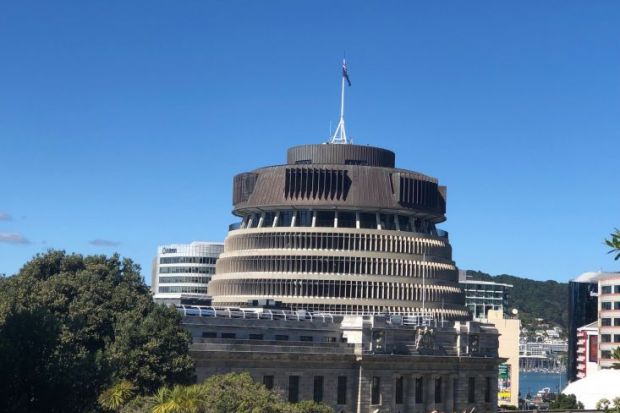New Zealand universities have been given breathing space in the 30 May budget, with the government boosting their teaching subsidies by 2.5 per cent and authorising tuition fee increases of up to 6 per cent.
Policy expert Dave Guerin said the governing coalition’s first budget was “neutral” for universities, with increased teaching revenue likely to offset inflation. But student debt will escalate, thanks to higher fees and a reorienting of the former government’s “fees free” scheme.
Tertiary education minister Penny Simmonds said that, from 2025, fees would be waived for final-year rather than first-year students. “This is a much better way to incentivise students to complete their studies,” she said. “We’re rewarding hard work and success.”
Tertiary institutions will share a NZ$266 million (£128 million) boost to their teaching subsidies over the next four years, with the eight universities attracting slightly over half of this money.
Universities New Zealand chief executive Chris Whelan said the increase would help cover universities’ costs while ongoing reviews considered more fundamental reform. “The increases that have come through today [are] not going to deal with our long-term problems,” he said. “But they will help us until we can get to the point where we can start talking about addressing those long-term problems.”
The budget offers no additional research funding. Mr Whelan said support for research training had been unchanged since 2019, despite inflation of almost 30 per cent over that period. He said every university had been forced to reduce doctoral numbers to ensure that PhD stipends kept pace with cost-of-living increases.
The Tertiary Education Union (TEC) said the budget had forced students to shoulder the “burden” of maintaining the real value of tertiary education funding. “[It] will limit opportunities, block pathways, increase inequalities and remove the ability of many young people from low-income families to see a future for themselves,” said national secretary Sandra Grey.
“The minister seems to think moving fees free to the final year of study will encourage completion. It won’t. What stops students from completing study is rent, food, transportation, need to work and mental health.”
Budget papers project that the changes to the fees free policy will deliver the government an NZ$877 million sugar hit over the next four years, because new students will be forced to wait – typically until 2027 – before attracting fee waivers. This figure does not take account of the extra costs of bankrolling loans for first-year study.
The back-ending of the fees free programme will be administratively complicated, given that the affected courses – which range from vocational certificates to doctorates – vary substantially in length, making it difficult to determine which year’s fees should be waived.
Other budget measures include increases to interest charges and late penalty payments for overseas-based kiwis with unpaid student loans. Higher visa fees, for international students among others, will net the government another NZ$457 million.
A further NZ$24 million will be recouped through “efficiency savings” on Education New Zealand and the TEC.
The budget allocates almost NZ$3 million for an “independent cost-benefit analysis” and “business case development” for the proposed medical school at the University of Waikato. And it cuts more than NZ$3 million from the budget of the National Centre of Research Excellence for Preventing and Countering Violent Extremism, based at Victoria University of Waikato.




